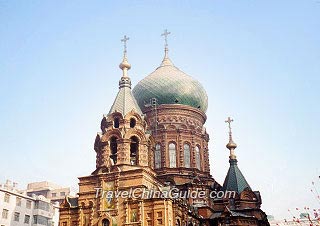Christianity in China
 As one of the three most popular religions (together with Islam and Buddhism) in the world, Christianity influences the belief and life of over 30% of the world's population. First introduced into China in the 7th century, Christianity has existed for a long time in the country, but has not been very influential. Since the beginning of the 20th century, it has developed quickly because of people's desire and the national policy for freedom of religions and beliefs.
As one of the three most popular religions (together with Islam and Buddhism) in the world, Christianity influences the belief and life of over 30% of the world's population. First introduced into China in the 7th century, Christianity has existed for a long time in the country, but has not been very influential. Since the beginning of the 20th century, it has developed quickly because of people's desire and the national policy for freedom of religions and beliefs.
Based on the Old Testament and New Testament, Christianity is a monotheistic religion based on belief in Jesus Christ. Originating in the Middle East, this religion abounded in Europe, and then gradually migrated to Asia, America, Africa, etc. Presently, Roman Catholicism, the Orthodox Church and Protestantism are the largest three sects of Christianity. The number of followers of the Christian faith reaches 2.2 billion around the world.
History of Development of Christianity in China
In 635, the ninth year of the reign of Emperor Li Shimin (599 - 649) of the Tang Dynasty (618 - 907), Nestorianism, which was considered as a heresy to Christianity at that time, came to China. Nestorianism once had a strong growth. In 845, Emperor Wuzong, a devout Taoist, decreed the prohibition of foreign religions. The spread of Nestorianism was stopped.
In the Yuan Dynasty (1271 - 1368), Nestorianism rose again, while at the same time Roman Catholicism began to surge too. In 1582, the tenth year of the reign of Emperor Wanli of the Ming Dynasty (1368 - 1644), Matteo Ricci, an Italian churchman who was proficient in astronomy and mathematics, came to China. He was one of the pioneers of evangelizing the country. In 1659, the 16th year of the reign of Emperor Shunzhi of the Qing Dynasty (1644 - 1911), a missionary, named Ferdinand Verbiest, arrived. In 1727, the fifth year of the reign of Emperor Yongzheng, Eastern Orthodoxy joined the Christianity spread trend in China. In 1807, during the reign of Emperor Jiajing, Robert Morrison, a Protestant, introduced Protestantism to the country. After the failure of the Opium War in 1840, the Qing Dynasty government signed a series of treaties, which allowed missionaries to teach the doctrines of Christianity.
During the Republic period (1911 - 1949), many evolutionary people, such as Sun Yat-sen, Song Jiaoren as well as the late Zhang Xueliang, were baptized as Christians. Even the ruler, Jiang Zhongzheng was a Christian. In 1949, after the founding of the People's Republic of China, the development of Christianity witnessed a series of twists and turns, and finally continued to spread rapidly.
 |
| East Church, Beijing |
Christianity in Present China
Nowadays, Christianity prevails in China especially the eastern and central provinces including Anhui, Zhejiang, Fujian, Henan, Hebei, Shanghai and Jiangsu. Its three main sects all have numerous followers. In the country, Christian is usually referred to Protestant, which has been the most popular group. There are over 23 million Protestants and about 50,000 adherents from family churches. The followers of Roman Catholicism reach 6 million. On Sundays, Christians get together in a home or a church to sing songs of praise, read the Bible, hear sermons, share thoughts, reflect on Scripture, pray, and other community activities. There would be special activities on major Christian festivals, such as Christmas Day, Good Friday, Easter, Ascension Day and Halloween.
There are 15 Christian theological colleges in the big cities of China. In addition, there are a number of Bible schools and Bible training center in some small cities.
Major Churches in China
 |
| Saint Sophia Cathedral, Harbin |
![]() Catholic Church:
Catholic Church:
East Church, Beijing
South Cathedral, Beijing
Church of the Savior, Beijing (Xishiku Church)
St. Joseph Cathedral, Tianjin (Old Xikai Church)
St. Ignatius Cathedral (Xujiahui Tianzhutang)
Shanghai Sheshan Cathedral of Virgin Mary
Guangzhou Sacred Heart Cathedral![]() Orthodox Church:
Orthodox Church:
Saint Sophia Cathedral, Harbin
Notre Dame Cathedral, Shanghai
( Orthodox Cathedral or New Music Road Church)![]() Protestant Church:
Protestant Church:
Shanghai International Protestant Church
Shanghai Holy Trinity Church (commonly known as the "Red Chapel")
Youag John Allen Memorial Church (Jing Ling Tang)
Shanghai Community Church
Moore Memorial Church (Mu En Tang)![]() Further Readings: Churches in Beijing Churches in Shanghai Churches in Hong Kong
Further Readings: Churches in Beijing Churches in Shanghai Churches in Hong Kong